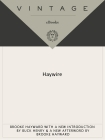Haywire, Brooke Hayward [the best ebook reader for android TXT] 📗

- Author: Brooke Hayward
Book online «Haywire, Brooke Hayward [the best ebook reader for android TXT] 📗». Author Brooke Hayward
We went for the first time to the Museum of Natural History, where I shivered at the sight of the huge blue whale floating over my head in the main hall and the vast rooms inhabited by dinosaur skeletons, the first fleshless bones I’d ever seen. While we were standing with noses pressed against the glass behind which lay a tawny African landscape with its appropriate spiral-horned eland and tufted gnu (shot and donated by Grandfather Hayward), a young black woman tapped Mother gently on the shoulder and said, “Excuse me, Miss Sullavan, can I please have your autograph?”
Mother mumbled something and shook her head. We clutched possessively at her coat, amazed that a stranger would know our mother’s name. The young woman repeated her question a little more plaintively.
Mother drew herself up and regarded the intruder with a cold eye. “I beg your pardon,” she said crisply, “but I think you have the wrong person. I am not Miss Sullavan.”
The stranger was now as confused as we. “Margaret Sullavan,” she said, thrusting forth a piece of paper and pencil, but Mother was already moving away.
“Come along, children,” she said, “and we’ll have a quick look at the mummies, which you will love.”
“But, Mother,” we exploded on the way down the marble stairs, “aren’t you Margaret Sullavan?”
“Yes, that is my professional name,” she answered, but before she could say anything else, we pounced on her with glee, clamoring all together, “But then you’ve told a lie, Mother, why did you tell such a terrible lie to such a nice lady? You don’t let us tell lies! She looked so sad when you said that—why didn’t you want her to know who you are?”
Mother sighed and waited for us to stop. “You see,” she said patiently and with slow emphasis on every word, so that she would never have to say it again, and she never did, “there are a lot of people in the world who think if they get the signature—autograph, it’s called—of someone who is famous down on a piece of paper—sometimes even collect these signatures in books—that that will somehow make them more important. Well, I feel sorry for them because they think they can have some part of me by having me write my name for them, but that doesn’t mean I approve of it, and besides, I certainly don’t want to be famous or looked at when I walk down the street or take you children to a museum.” Here she gathered us in her arms as we were about to come to the mummies and spoke with such intensity that we felt swept up and purified by some glorious hurricane: “I think people who try to intrude on other people’s privacy or personal life in any way—and you children are my personal life—I think those people are rude and silly. Now, look—look!” she exclaimed, her eyes widening with excitement and her low magical voice stretching until it seemed it might snap and carry us with it, so that we sighted down her outstretched hand, with its crimson enameled nails glistening like Fabergé charms, at the room that danced before us and at the gold-inscribed sarcophagi tilted so that we could see their stained linen-wrapped contents.
One cold night, Father took me to the Morosco to see Mother in The Voice of the Turtle. Mother disapproved vociferously, but Father had his way. “Your mother is the best actress in the world—I ought to know, for God’s sake—after all, I’ve been her agent for eleven years.” And when Mother protested: “Come on, Maggie, let her sit backstage, can’t possibly hurt her; for God’s sake, she may never see you in anything as good again.” And so I sat backstage in the wings in my pajamas and bathrobe and saw my first play. Mother took me with her to her dressing room whenever she came offstage to change; I was enthralled watching her apply layers of mascara to her lashes and lipstick out beyond the natural lines of her own mouth (“My mouth is just a straight line, the horror of all Hollywood make-up men, and so is my crooked tooth and my mole and high forehead and lousy chin”), and move swiftly from one change to another without a superfluous motion or sound, while her maid slipped one dress over her head and removed another, leaving her hair and make-up unruffled. At the end of intermission, the stage manager would knock—“Two more minutes, Miss Sullavan”—and Mother would grab her pink swan’s-down powder puff, dab her nose with a last fillip, and snatch my hand, whispering, “Come, darling, hurry, hurry or they’ll murder me!” and we would race to the wings where I would plop down in my chair and Mother would just keep on going as Sally Middleton. During one change, as she slid into a silvery dress, she admonished me breathlessly, “Now, don’t be horrified by this next scene; everybody thought this play was very immoral when they first read it, because of this scene, but remember it’s only make-believe. I close my eyes and pretend I’m somebody else, and so must you, but don’t forget I’m really your mother and it’s your father I really love, and you and Bridget and Bill.” But the audience and even I gasped audibly when, at the end of the second act, Elliott Nugent took a pair of pliers from the kitchen drawer because the zipper had stuck on her silver dress, and, wrenching it as hard as he could, stepped back as the dress fell to Mother’s feet, leaving her standing in nothing but a slip as the curtain came down. “Your mother,” reiterated





Comments (0)